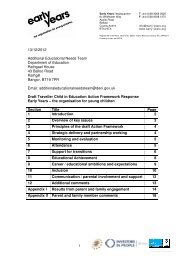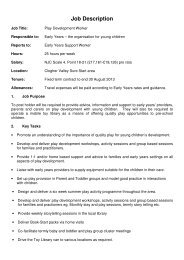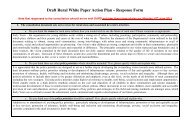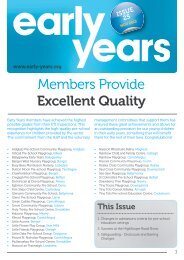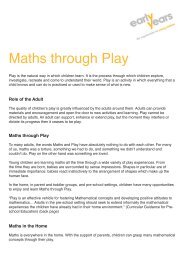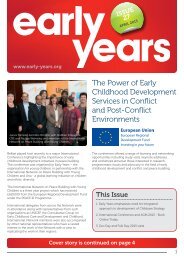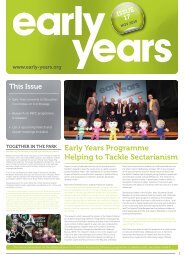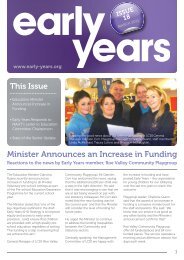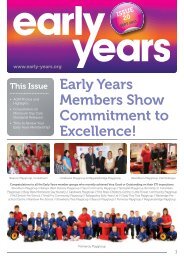Learning from Nine Examples of Peacebuilding Evaluation
Learning from Nine Examples of Peacebuilding Evaluation
Learning from Nine Examples of Peacebuilding Evaluation
Create successful ePaper yourself
Turn your PDF publications into a flip-book with our unique Google optimized e-Paper software.
Case Study 5: Friends <strong>of</strong> the Earth Middle East: Good Water Neighbors<br />
Summary<br />
Through both formal and informal and external and internal evaluation<br />
means, Friends <strong>of</strong> the Earth Middle East sought to measure the impact <strong>of</strong><br />
their work to foster dialogue and mutual understanding in cross-border<br />
communities. While the informal monitoring process allowed for extensive<br />
learning within the program staff, the external evaluation was helpful<br />
in assessing the attitudes <strong>of</strong> the program stakeholders and meeting donor<br />
accountability needs.<br />
Overview<br />
Organization<br />
Friends <strong>of</strong> the Earth Middle East (FoEME), a member <strong>of</strong> Friends <strong>of</strong> the Earth<br />
International, is a trilateral organization with <strong>of</strong>fices in Jordan, Palestine, and<br />
Israel. The organization focuses on environmental peacebuilding through<br />
shared water resources. It has over sixty-five paid staff within the region and<br />
hundreds <strong>of</strong> volunteers and community coordinators in the areas where it<br />
works.<br />
Program Evaluated<br />
Good Water Neighbors seeks to use mutual dependence on water as a basis<br />
for dialogue and cooperation between Jordanians, Palestinians, and Israelis.<br />
The project includes youth “water trustee” groups, adult forums to support<br />
cross-border cooperation, “Neighbors Path” eco-tours to educate on water<br />
issues, and mayors’ networks to support municipal-level cross-border cooperation<br />
and problem solving.<br />
27<br />
<strong>Evaluation</strong> Strategy<br />
FoEME discussed an integrated set <strong>of</strong> evaluation strategies. They presented<br />
a two-by-two matrix <strong>of</strong> formal/informal and internal/external strategies.<br />
The formal strategies included surveys <strong>of</strong> activity participants (youth participants,<br />
adult activists, and participants in the Neighbors Path eco-tours)<br />
and control groups and semi-structured interviews with key decision makers<br />
in the communities where activities were implemented. The evaluation<br />
sought to determine whether FoEME activities had contributed to: 1) promoting<br />
awareness <strong>of</strong> water issues within the participating communities, and 2)<br />
improving relationships between neighboring communities.<br />
Overall, in regard to the youth programming, FoEME reported that the<br />
evaluation showed a positive impact on attitudes on both environmental<br />
topics and peacebuilding compared with the control group. The exception<br />
was that the surveys did not show a change in the level <strong>of</strong> knowledge about<br />
water issues. The level <strong>of</strong> impact was different among Palestinian and Israeli



